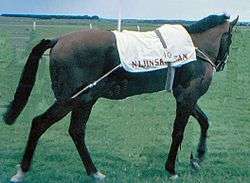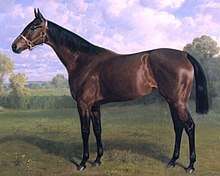British Classic Races
The British Classics are five long-standing Group 1 horse races run during the traditional flat racing season.[1] They are restricted to three-year-old horses and traditionally represent the pinnacle of achievement for racehorses against their own age group. As such, victory in any classic marks a horse as amongst the very best of a generation. Victory in two or even three of the series (a rare feat known as the English Triple Crown) marks a horse as truly exceptional.
Races
The five British Classics are:
| Race | Date | Distance | Course | First Run | Qualification |
|---|---|---|---|---|---|
| 2,000 Guineas Stakes | Late April / early May | 1 mile (1,609 m) | Newmarket | 1809 | Three-year-olds |
| 1,000 Guineas Stakes | Late April / early May | 1 mile (1,609 m) | Newmarket | 1814 | Three-year-old fillies |
| Epsom Oaks | Late May / early June | 1 mile 4 furlongs 10 yd (2,423 m) | Epsom Downs | 1779 | Three-year-old fillies |
| Epsom Derby | First Saturday in June | 1 mile 4 furlongs 10 yd (2,423 m) | Epsom Downs | 1780 | Three-year-olds |
| St Leger Stakes | September | 1 mile 6 furlongs 132 yd (2,937 m) | Doncaster | 1776 | Three-year-olds |
It is common to think of them as taking place in three legs.
The first leg is made up of the Newmarket Classics – 1,000 Guineas and 2,000 Guineas. Given that the 1,000 Guineas is restricted to fillies, this is regarded as the fillies' classic and the 2,000, which is open to both sexes, as the colts' classic, although it is theoretically possible for a filly to compete in both.
The second leg is made up of The Derby and/or Oaks, both ridden over 1 1/2 miles at Epsom in early June. The Oaks is regarded as the fillies' classic, the Derby as the colts', although, as with the Guineas, a filly could theoretically contest both.
The final leg is the St Leger, held over 1 mile 6 1/2 furlongs at Doncaster and is open to both sexes.
The variety of distances and racecourses faced in the Classics make them particularly challenging as a series to even the best horses. It is rare for a horse to possess both the speed and stamina to compete across all these distances, making the Triple Crown a particularly notable achievement. In fact, in the modern era, it is rare for any attempt on the Triple Crown to be made.
History
Although the oldest race in the series, the St Leger, was first run 1776, the races were not designated "classics" until 1815,[2] shortly after the first running of the 1,000 Guineas.
Multiple classic winners
(see also Triple Crown of Thoroughbred Racing)

In 1902 Sceptre became the only racehorse to win four British Classic Races outright, winning both Guineas, the Oaks and the St Leger. Previously, in 1868, Formosa won the same four races but dead-heated in the 2,000 Guineas.[3]
Fifteen horses have won the standard Triple Crown (2,000 Guineas – Derby – St Leger), the last being Nijinsky in 1970.
In addition to Sceptre and Formosa above, eight horses have won the fillies' Triple Crown (1,000 Guineas – Oaks – St Leger), the last being Oh So Sharp in 1985.
Many horses have won two classics, some of whom have gone on to attempt the Triple Crown, losing in the last leg at Doncaster. The most recent example of this was the Aidan O'Brien trained Camelot, who having won the 2,000 Guineas and Derby, finished second in the St Leger in 2012.
Three classic wins
- Crucifix 1840
- West Australian 1853
- Gladiateur 1865
- Lord Lyon 1866
- Hannah 1871
- Apology 1874
- Ormonde 1886
- Common 1891
- La Fleche 1892
- Isinglass 1893
- Galtee More 1897
- Flying Fox 1899
- Diamond Jubilee 1900
- Rock Sand 1903
- Pretty Polly 1904
- Pommern 1915
- Gay Crusader 1917
- Gainsborough 1918
- Bahram 1935
- Sun Chariot 1942
- Meld 1955
- Nijinsky 1970
- Oh So Sharp 1985
Two classic wins
- Champion (1800)
- Eleanor (1801)
- Smolensko (1813)
- Neva (1817)
- Corinne (1818)
- Pastille (1822)
- Zinc (1823)
- Cobweb (1824)
- Cadland (1828)
- Galata (1832)
- Queen of Trumps (1835)
- Bay Middleton (1836)
- Cotherstone (1843)
- Mendicant (1846)
- Sir Tatton Sykes (1846)
- Surplice (1848)
- The Flying Dutchman (1849)
- Voltigeur (1850)
- Stockwell (1852)
- Blink Bonny (1857)
- Imperieuse (1857)
- Governess (1858)
- The Marquis (1862)
- Macaroni (1863)
- Blair Athol (1864)
- Achievement (1867)
- Pretender (1869)
- Reine (1872)
- Marie Stuart (1873)
- Spinaway (1875)
- Camelia (1876)
- Petrarch (1876)
- Silvio (1877)
- Jannette (1878)
- Pilgrimage (1878)
- Wheel of Fortune (1879)
- Iroquois (1881)
- Thebais (1881)
- Shotover (1882)
- Busybody (1884)
- Melton (1885)
- Miss Jummy (1886)
- Reve d'Or (1887)
- Ayrshire (1888)
- Seabreeze (1888)
- Donovan (1889)
- Memoir (1890)
- Mimi (1891)
- Amiable (1894)
- Ladas (1894)
- Sir Visto (1895)
- Persimmon (1896)
- St Amant (1904)
- Cherry Lass (1905)
- Signorinetta (1908)
- Minoru (1909)
- Sunstar (1911)
- Tagalie (1912)
- Jest (1913)
- Princess Dorrie (1914)
- Fifinella (1916)
- Tranquil (1923)
- Manna (1925)
- Saucy Sue (1925)
- Coronach (1926)
- Trigo (1929)
- Cameronian (1931)
- Hyperion (1933)
- Windsor Lad (1934)
- Exhibitionnist (1937)
- Rockfel (1938)
- Blue Peter (1939)
- Galatea (1939)
- Godiva (1940)
- Herringbone (1943)
- Sun Stream (1945)
- Airborne (1946)
- Imprudence (1947)
- Musidora (1949)
- Nimbus (1949)
- Tulyar (1952)
- Never Say Die (1954)
- Crepello (1957)
- Bella Paola (1958)
- Petite Etoile (1959)
- Never Too Late (1960)
- St Paddy (1960)
- Sweet Solera (1961)
- Royal Palace (1967)
- Sir Ivor (1968)
- Altesse Royale (1971)
- Mysterious (1973)
- Dunfermline (1977)
- Sun Princess (1983)
- Midway Lady (1986)
- Reference Point (1987)
- Nashwan (1989)
- Salsabil (1990)
- User Friendly (1992)
- Kazzia (2002)
- Sea The Stars (2009)
- Camelot (2012)
- Minding (2016)
- Love (2020)
Records
Most wins as a horse
- Sceptre – 4 wins (1902)
Most wins as a jockey
- Lester Piggott – 30 wins (1954–1992)[4]
Most wins as a trainer
John Scott - 40 wins
See also
- Category:British Classic Race winners
- English Triple Crown race winners
- French Classic Races
- Japanese Classic Races
- Irish Classic Races
- United States Triple Crown of Thoroughbred Racing
- Canadian Triple Crown of Thoroughbred Racing
References
- "Glossary". National Horseracing Museum. Retrieved 8 April 2013.
- "The History of Horse Racing". Equine World. Retrieved 8 April 2013.
- Thoroughbred Heritage: Sceptre Retrieved 13 September 2010
- "Famous Jockeys". Racing-Insider. 3 September 2013. Retrieved 7 April 2018.
